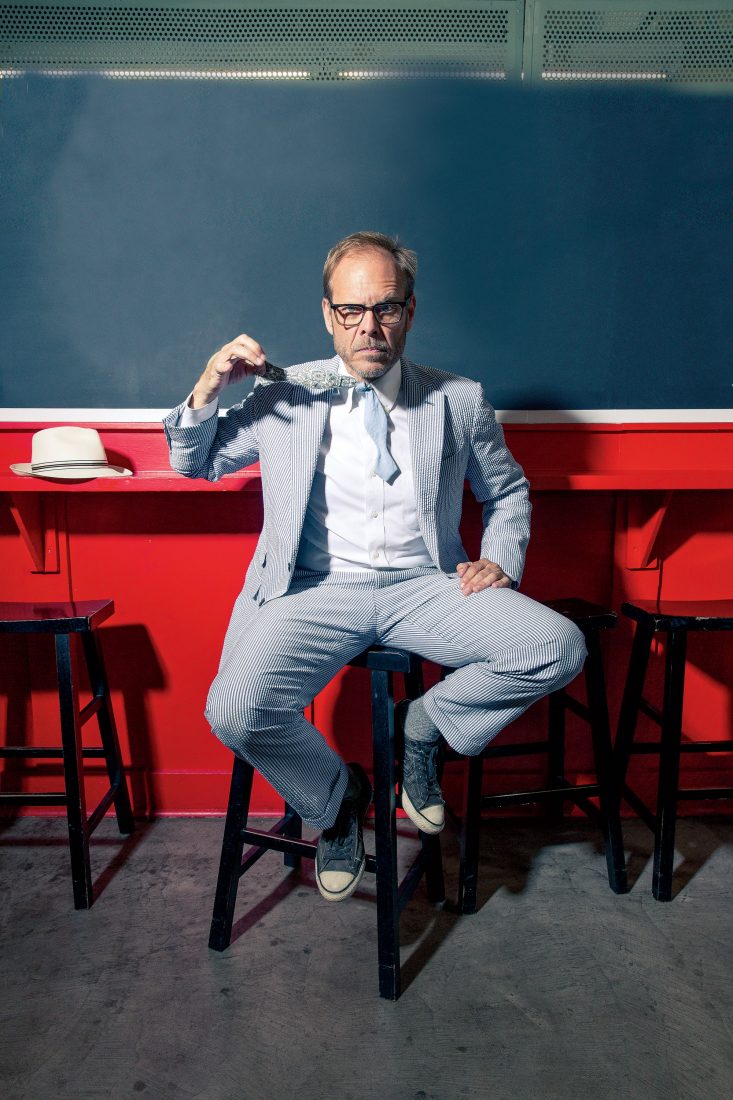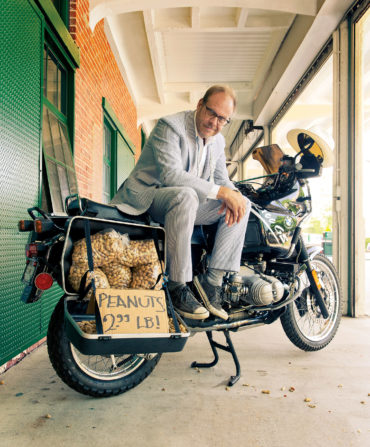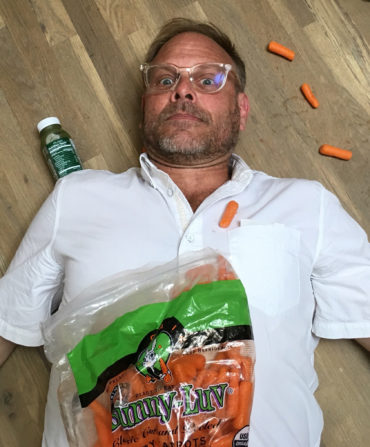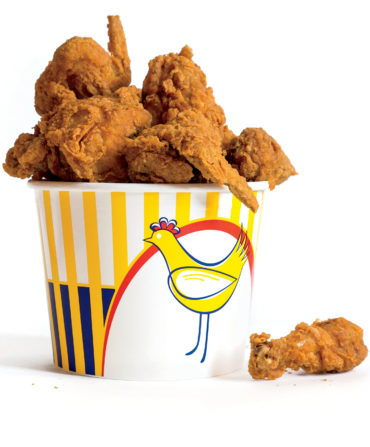Alton Brown first came to our attention as the fast-talking host of Good Eats, the fourteen-year-long Food Network franchise that taught home cooks to embrace madcap gadgetry, test-tube science, and burping puppets, and provided a new model for what a cooking show could be.
Brown has since branched out into more series (his latest, Cutthroat Kitchen, premiered late last year), books (his first, I’m Just Here for the Food, won a James Beard Award), and the role of competitive cooking sage (he just wrapped the latest season of Food Network Star). Every step of the way, he has leaned on a quality not widely assumed necessary for success as a celebrity chef: a hyperactive, finely tuned mind.
Though he was born in Los Angeles, Brown has deep Georgia roots on both sides of his family and has lived there for most of his life. He makes his home, with his wife and daughter, in Marietta.
Brown is currently preparing for the third leg of his traveling variety show, Alton Brown Live! The Edible Inevitable Tour, which kicks off in Athens, Georgia, in October—and judging by the sold-out crowds he’s attracted thus far, he might have found his most engaged audience yet.
What are your food memories of moving as a child from Southern California to Georgia?
Coming to the South, you realize that people identify who they are and what they are greatly through food. Food is a coat of arms. My grandmother Mae, whom I adored, owned a dress shop called the Flair for Fashions, and it was a real kind of hub for women in the town. I learned very early that women competed against each other culinarily and that recipes were like currency. It’s like, You can’t make lemon pie because in this town, Betty owns lemon pie. And that’s when I started to really understand food and understand the value of food and what it meant to Southern identity.

Watching cooks compete on television seems very modern, but maybe it taps into something that’s been with us all the time?
My grandmother never understood how there could possibly be a network about food…you know, you’ve just got to do it. Cooking is what you had to do. My grandmother, her mother, her grandmother, got up at four in the morning and stoked a fire and baked biscuits every damn day because that’s what women did. But their identity, their pecking order, their totem pole of the Southern female, was based upon how you baked, primarily and above all. I still have a great-aunt, now in her nineties, who will not give up her coconut cake recipe, and no one within fifty miles will make a coconut cake without drawing their curtains, for fear that she’ll know.
Through your travels, you’ve gotten to taste regional cooking across the country. Are you worried at all that food, especially Southern food, is becoming homogenized?
I think there’s still a strong sense of place at the Southern table, but it must be sought out. And its authenticity is constantly being challenged. It doesn’t help that the stereotypes of what Southern is continue to be perpetuated to the rest of Planet Earth. I don’t think many people authentically get what the South is. At least with food, that must be sought out. Because authenticity of food here is always related to story and it’s always related to history, and that takes time and energy and discipline and fortitude. Do I see hope? Sure. Do I see food traditions being lost? Yeah, sure I do. But you see that everywhere. More than any other food type, Southern food comes out of small-scale agriculture and the community that comes from that, so until we get that back I think it’s going to be very hard to get the real Southern soul back. And the stereotypes of what people think the South is, and what Southern food is, make it even harder. The other reason people are uncomfortable is that to deal with real Southern food, you must deal with race. The traditions that come out of the African experience, as well as the traditions that come out of the Appalachian experience, those dualities give force and real life to what Southern identity is, because Southern identity doesn’t exist without food. There are two things that, if you removed them, would make the South simply cease to exist: One is food, the other is the Allman Brothers.

What can people expect if they buy tickets to your Edible Inevitable Tour?
It is a culinary variety show, a two-hour stage show centered around food. I was mostly a child of the seventies. I loved The Sonny & Cher Show. I loved how you could see a comedy show and then you could see somebody sing, and this is based on that. I do some of my songs, food songs, which hopefully are funny. They make me laugh and so far they’ve made other people laugh. There’s also a mini-lecture–slash–stand-up segment called “10 Things I’m Pretty Sure I’m Sure About About Food.” And there are two very large, very unusual food demonstrations, both of which involve audience interaction. One tends to involve so much mess that we give the first five rows ponchos. It’s the most fun I’ve ever had working.
Beyond ponchos, you wear bow ties and have your own line. Is there a connection between bow ties and Southern food?
Yes! Well, Southern culture in general…I’m not going to say food. Bow ties are the most iconic piece of Southern menswear. What they say is, I care. I’m willing to be a little bit of a dandy, but I’m a rake at the same time. I’m a little bit dangerous, but I’m a little bit floppy, too. I remember being on a book tour for Feasting on Asphalt, and I was doing a signing in Oxford, Mississippi, in this old-school men’s store, and it was so hot I needed to buy a seersucker suit. And as I was walking out, there was this yellow bow tie that had little blue monkeys on it. When my father died, I was bereft of male role models and for some reason I latched onto Humphrey Bogart. His character Rick Blaine in Casablanca was everything I wanted to be as a man—and he wore bow ties. I learned how to tie them in the eighth grade because Bogart did. I hadn’t worn them in a long time, and I’m walking out of this men’s store in Oxford and I see this yellow tie and I’m like, I’m going to buy that freaking tie. And when I put it on, I became something.
So do you consider your “Southernness” part of your image?
It’s reflected in the fact that to be a Southerner suits everything that I want to be. One, you’re a little batshit crazy. All good Southerners are pretty much kinda mad. I like that. Being Southern means constantly being at war with God over something. We all are. And I embrace that, too. I embrace that battle. I embrace the traditions that are hard to let go. I like traditions. I may have arrived today on a motorcycle, but under my motorcycle suit, I’m wearing seersucker.









